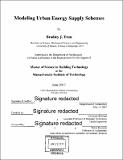Modeling urban energy supply schemes
Author(s)
Tran, Bradley J
DownloadFull printable version (6.013Mb)
Other Contributors
Massachusetts Institute of Technology. Department of Architecture.
Advisor
Christoph Reinhart.
Terms of use
Metadata
Show full item recordAbstract
Rapid urbanization places increased pressure on governments and cities to use economical, low-carbon energy supply strategies. This manuscript details efforts to develop an integrated energy supply and demand analysis tool to help urban planners and designers evaluate and compare schemes to satisfy the electric, heating, and cooling demands of urban areas. Current simulation tools tend to focus on either the demand- or supply-side aspect of the energy challenges cities face. Additionally, these tools are often overly simplistic or complex with steep learning curves, rendering analyses directionally incorrect or inaccessible. The developed framework integrates a 3D modeling platform, an industry-standard energy simulation engine, and variable-efficiency supply models to increase the accessibility and usability of results. This will help municipalities, developers, and urban planners make informed decisions related to energy supply schemes at the neighborhood level regarding estimated energy consumption, carbon emissions, and energy costs. The approach is applied to case studies from six mixed-use neighborhood designs in three cities: Boston, Lisbon, and Kuwait City. The results illustrate the significance of using load- and temperature-dependent supply models instead of constant COP models. The results underscore the influence that weather, equipment, and regional power generation characteristics have on the optimal energy supply strategy for a given neighborhood design.
Description
Thesis: S.M. in Building Technology, Massachusetts Institute of Technology, Department of Architecture, 2017. Cataloged from PDF version of thesis. Includes bibliographical references (pages 23-25).
Date issued
2017Department
Massachusetts Institute of Technology. Department of ArchitecturePublisher
Massachusetts Institute of Technology
Keywords
Architecture.